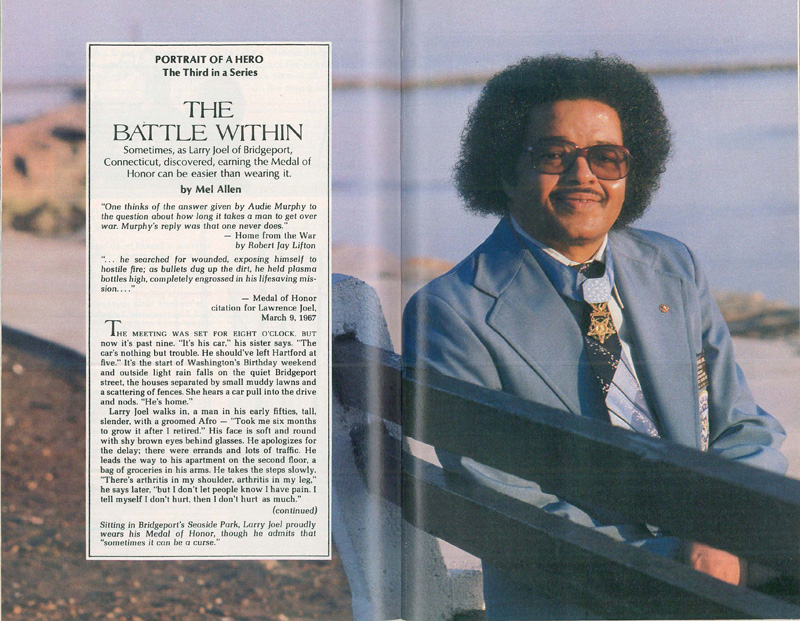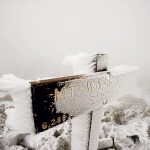Yankee Classic: The Battle Within
“One thinks of the answer given by Audie Murphy to the question about how long it takes a man to get over war. Murphy’s reply was that one never does.”— Home from the Warby Robert Jay Lifton“… he searched for wounded, exposing himself to hostile fire; as bullets dug up the dirt, he held plasma […]

Coffee By Design | Portland, Maine
Photo Credit : Katherine Keenan“One thinks of the answer given by Audie Murphy to the question about how long it takes a man to get over war. Murphy’s reply was that one never does.”
— Home from the War
by Robert Jay Lifton
“… he searched for wounded, exposing himself to hostile fire; as bullets dug up the dirt, he held plasma bottles high, completely engrossed in his lifesaving mission …. “
— Medal of Honor
citation for Lawrence Joel, March 9, 1967
The meeting was set for eight o’clock. but now it’s past nine. “It’s his car,” his sister says. “The car’s nothing but trouble. He should’ve left Hartford at five.” It’s the start of Washington’s Birthday weekend and outside light rain falls on the quiet Bridgeport street, the houses separated by small muddy lawns and a scattering of fences. She hears a car pull into the drive and nods. “He’s home.”
Larry Joel walks in, a man in his early fifties, tall, slender, with a groomed Afro — “Took me six months to grow it after I retired.” His face is soft and round with shy brown eyes behind glasses. He apologizes for the delay; there were errands and lots of traffic. He leads the way to his apartment on the second floor, a bag of groceries in his arms. He takes the steps slowly. “There’s arthritis in my shoulder, arthritis in my leg,” he says later, “but I don’t let people know I have pain. I tell myself I don’t hurt, then I don’t hurt as much.”
He’s lived in the apartment above his sister’s since he retired from the army in 1973, commuting the hour to Hartford where he works for the Veterans Administration as a counselor. “The drive’s wearing me down,” he says. “Maybe I should move to Hartford.” He puts water on the stove for the instant coffee he gulps incessantly. “I haven’t had a drink in four years,” he says. “This is my replacement.”
He puts a pack of Kools on the kitchen table, saying it’s the only habit he has left. “I haven’t talked about the medal,” he says. “Too many bad experiences earning it, and too many bad experiences living with it. I’ve been wanting to talk about this a long time. But I haven’t been ready.” He was a medic in the 173rd Airborne, the first ground troops sent to Vietnam. He arrived in May 1965, the rainy season.
“They told us to bring bathing suits, we’d be there only a few weeks. We’d patrol days and never run into the enemy. We had to simulate death so we’d know how to deal with it. One night something was moving in the bushes and some trigger-happy guys let loose. The next morning we found two hogs, 250 pounds apiece. We put one on a chopper and made a barbecue pit at camp. We smoked up some delicious ribs. That’s what the war was for us, until November 8, 1965.
“I was 37 and a lot of the young soldiers followed me around like I was their father. They’d come to me with their problems. Except for our platoon sergeant, who’d been in Korea, none of us had seen combat.
“We were told to travel light that day — we had one more area to check out, then we’d be lifted out. I had a premonition that morning. As I was walking my mind flashed to my daughter and wife and son. They say we crossed water that morning but I don’t remember going through water. I guess there are some things I’ll never remember. We stopped at a clearing where hills rose on two sides. We saw fresh camouflage had been broken; we knew something was in there. Nothing was moving. But there were three regiments of North Vietnamese just waiting for us.
“All of a sudden it was like the Fourth of July. I was with four riflemen and we dived behind this little rock jutting up by the side of the hill. The rain had washed away the soil, and we just piled on top of each other. We could hear bullets ricocheting off the rock. One of the men with me got hit in the kneecap. He was bleeding bad and I bandaged him up, gave him morphine and a can of albumin serum. I thought for sure he would make it. After about half an hour it got reed quiet. I heard, ‘Medic.’ That’s all I could hear — ‘Medic. Medic.’ I looked over behind the rock and saw them lying on the side of the hill, some sitting up with rifles across them. That’s how they got killed, as if they were sitting on the side of the hill sightseeing.
“I’d always wondered what combat was like when I heard my buddies tell World War II stories, and I always figured I’d be a survivor — until it happened. They were calling for me and I looked out and I couldn’t see anything but jungle though I knew the enemy was all around. I was afraid, and I just froze. I couldn’t move . . . “
When he pauses you can hear the steady drip from the shower across the hall from the kitchen. He gets up stiffly to put on more hot water and knocks the tape recorder to the ground. “Is it all right?” he asks. ”I’m opening up, but I can’t do it myself.” He gets his coffee, and taking no chances on disturbing the tape recorder, changes his seat.
“I could hear a kid named Swoboda moaning. I called over to see if he could make it to where we were, but he acted as if he didn’t hear me. He’d just turned 18 and it was his first patrol. I could see him lying on the side of the hill and I thought, ‘If they ever ask, hey, Doc, where were you? I wouldn’t be able to live with myself.’ I tried to run to him but they opened up on me and I got hit in the leg. I ran back to the rock and bandaged it up and gave myself morphine. I tried crawling back to the kid. That’s when we called in the artillery. It fell short and hit some of our own people. One of our guys went wild from the pain and we had to run and catch him and hold him down while I patched him up. I got mad then. I just forgot my fear. I said a little prayer, ‘If I get hit, please don’t let it be a vital area, because I’ll be knocked out of action. Let it be just a little bit, so I can still do something for my people.’
“All morning long we moved the wounded, but the helicopters couldn’t get in to evacuate them. Another company came to help us and got pinned down. I ran out of supplies and grabbed some more and began treating their men too. The other medics were a lot younger than me and weren’t moving fast enough — I just took over and told them to straighten bandages. Three different times I had a cigarette in my hands and never got to light it. A few hours later I got hit in the leg again. It swelled real bad but I didn’t want more morphine. I got a stick and used it as a crutch. I’d throw it to the ground, treat the soldier, then move on to the next one.
“Once it got real quiet. I said, ‘Please let them be going home. They’ve hurt us enough. Let us pick up our sick and dead and let us go home.’ Then they blew their bugles on us — they were charging — the saddest sound I ever heard. The battle lasted all day and into the night. That night I went back to where I thought would be a clearing for evacuation but there wasn’t a clearing, only the wounded and dead lying on ponchos. I found the soldier who’d been hit beside me that morning. He’d become delirious, knocked his I.V. out, and he’d died. It’s always bothered me knowing that if I’d stayed with him he’d have lived. But there was too much going on.
“It rained that night and we sat up under ponchos trying to keep everyone dry. In the morning the choppers came to get us out. That’s when I gave myself another shot of morphine. Our battalion had 69 killed, 110 wounded. Nearly half the men of my company were either killed or seriously wounded. My platoon sergeant told me, ‘Doc, you did a good job. I’m going to put you in for something if it ain’t nothing but the Silver Star.’ At the camp when they got ready to pull my bandage off I broke down and cried. I couldn’t find tears on the battlefield. I wanted to cry, but I couldn’t.”
Larry’s 17-year-old nephew, with whom he shares the apartment, comes up the stairs. He’s quiet with strangers around and quickly goes into his room. Larry stands up, stretches, puts water on to boil. He goes into the living room, where a framed jigsaw puzzle of a covered bridge hangs on a wall. He shows off his tropical fish and his old army foot locker painted green, which he uses as a small table. During the last months of World War II he dropped out of school. Too young for the navy he joined the merchant marine. When he turned 18 he joined the army, and was shipped to Italy. “It was a segregated army then and they had so many black troops they didn’t know what to do with us. The only contact we had with white troops was our white company commander.” He stayed in the army until 1949. In 1952, while working in a Baltimore munitions factory, he got “armysick. I missed my buddies. I wanted to go to Korea as a paratrooper. I went back for the jump boots and the glider patch that said I was one of the elite.” He was too late for action, but he decided this would be his career, he’d stay in 20 years.
There’s a shout from downstairs. A friend is borrowing his car to take Larry’s sister to work. Larry checks the time. It’s 11:15. He wipes his eyes and gets his coffee, spooning Sweet ‘N Low into a mug printed “Larry.” He sits back down at the kitchen table.
“They operated on me that morning. That evening my company commander came over. He said, ‘Doc, they’re writing you up right now for the Medal of Honor.’ I didn’t believe it. All I did was my job — I didn’t take no hill. General Westmoreland came to my bed and congratulated me. About a week later I read my citation and shook all over. It took a long time before I could read it and not shake. Gangrene set in in my wounds. For two weeks they squirted vinegar and water in them. I’d put gauze in my mouth, stick my head under the pillow, and holler as loud as I could. I wasn’t gray when I went to Vietnam. I was in the hospital two weeks before I saw my face and I looked at my beard and it was white.
“I was in the hospital in Japan for three months. I’d keep hearing how far my citation had moved up the chain of command. I returned to Vietnam February 25, 1966, three days after my 38th birthday. I went on patrols for another month, then left for home on April 7. We came through the terminal in San Francisco with our uniforms on and our combat ribbons and the people just went about their business as if we’d been on a joy trip.”
He yawned deeply. “Oh, my jaw’s getting tired,” he said. “What’s your first name again?” I told him.
“Strange war,” he said. “Strange war. My wife told me to catch the limousine at the airport. She didn’t come to meet me. I came home and my little daughter was out hanging clothes on the line, and my son was in the house and he greeted me and gave me $3 to pay the limousine. My wife was working at her beauty shop. An hour later she came home, took an hour off to greet me, then went back to work. I’d been gone one year.”
There’s another shout from downstairs. His car has gone dead downtown. I drive us the mile or so to the lipstick factory where his sister works. “I know what’s wrong,” Larry says. “It’s loose on the connection.” There’s an old broom handle in the back seat of his car, apparently a well-used repair tool. He presses the battery cable connection with the end of the broom handle while I work the ignition. The engine roars to life, he throws the handle in the back seat and drives home.
At noon on Washington’s Birthday he is cleaning his apartment, wearing a black robe. It’s his birthday also, his 53rd. He says he’s had trouble sleeping, the talking has made him restless. He’s had bad dreams, but for the first time he feels like finding the guys in his old outfit. It’s about 50 degrees outside with a high blue sky. He dresses in his sharp blue Medal of Honor Society blazer for a photo session at nearby Seaside Park. There are lots of joggers along the walk beside the sea in the early afternoon, and some kids playing softball in the mud. When he poses he holds his back military straight, seemingly shedding five years. We drive to a small Greek restaurant, a “mom and pop” place, in downtown Bridgeport. He orders bluefish and spinach and coffee. Behind the grill the tall swarthy son of the owners is in high spirits — that night he will fly to Greece to be married.
“I always thought that the girl I married would be my wife forever,” Larry says. He lights a cigarette. “But I’m getting ahead of myself.”
“My ceremony was set for March 9, 1967, and they laid the red carpet down for me. I would be the first medic in Vietnam to get the medal, the first black soldier to live to get the medal in any combat action. No black soldier ever walked away with it. I was the first and I felt very proud. The day of my ceremony was a nice warm sunny day – it seemed made just for me. I trooped the lines with President Johnson as the bands played. I was told, ‘This is your parade. If you want to stop and say hello to friends, go ahead. Don’t worry about keeping in step with the President; the President will keep in step with you.’
“From that day on I became a celebrity to the army and I went on tour – Denver, Chicago, Cleveland: schools, hospitals, recruiting appearances. Every time I looked around I was called to the White House for some function. I was in Chicago and a reporter took me to the family of Milton Olive, a GI who’d thrown himself on a grenade. His parents showed me his room. They showed me his trains – he was just 19. They showed me his cameras – he was training to be a photographer like his father. It looked like they had his room all set up waiting for him to come home. The reporter asked us to take a picture together. I had my medal and they had their son’s medal in their hands. He was killed in the same war I was in and he was my son’s age. The word ‘posthumous’ goes right through me.
“Sometimes I just wanted to be by myself and forget. I drank more and more to suppress it and not talk about it. I never felt I was a ·hero. At the base I’d walk into a bar and never have to spend a penny. I’d get done one and there’d be another waiting. I couldn’t go anyplace without somebody making an announcement and I’d have to take a bow. Once my wife got a speeding ticket and it made the front page – ‘wife of Lawrence Joel.’ I learned to be so careful about what I did, what I said, how I said it.
“My wife would work very late in the beauty shop, my children were nearly grown and off on their own, and I was home alone. We had some terrible fights. She’d say I wouldn’t have risked my life if someone hadn’t been watching. Sometimes I’d run out of the house and stay drunk for three days. I didn’t know what I was going through. I figured I was just feeling sorry for myself. I didn’t know that everybody has problems when they first get the medal. You have to learn to live with it. There’s some that put it away as soon as they get it and never mention it again. When they die they find their ribbon as clean as the day they first got it. And everyone who goes into combat gets wounded, whether they know it or not. It leaves a mark forever. I’d changed but I didn’t know it. I was traveling and people called me hero, but I felt like nothing. It got so bad at home I got a room in the barracks. My son was caught in the middle. Once we were fighting and we looked up and he was gone. We broke up shortly after that.
“Some officers looked down on me if I refused an appearance. Others thought I was avoiding detail and was just chasing glory. I felt tossed between the Devil and the Lord Almighty. I got sick of trying to please so one day I said I wanted to go back to Vietnam. I spent that Christmas 1969 in Vietnam. That’s how bad I wanted to escape.
“I stayed 17 months that time. I was assigned to the brigade commander and I’d go with him in his helicopter twice a day when he directed operations. I asked to go on patrol but they wouldn’t let me. (He received a Bronze Star for his actions during a mortar attack, however.) When I came home I couldn’t adjust to regular soldiering. I got a ticket for drunken driving and I saw the handwriting on the wall. I had my 20 years so I retired. I had five sisters and a brother in Bridgeport. All I had was my foot locker, $1,500, and some medals. I got a job at the V A and threw myself into it. I put myself in the hospital to stop drinking. I’d tried stopping so long for other people – when I tried stopping for myself I found I could do it. I don’t think I really came back from Vietnam until the day I finally stopped drinking.”
He finishes his dinner in silence. Because he’s diabetic he downs another coffee in place of dessert. When he walks out the door he calls to the young Greek, “Good luck.”
A few months passed. He applied to be health administrator of a veterans’ nursing home, a job he wanted very badly, and was rejected. He said he was really feeling the strain of his job, often feeling he was on the wrong side, having to tell veterans their claims were not justified under the law. Sometimes the wrath of a veteran denied benefits would be directed at Larry; at such times he said he felt powerless. He just wanted out. In summer word came that Larry was in intensive care in the VA hospital, stricken with an ulcer. “If the doctor had told me I was dying,” he’d say later, “I wouldn’t have gotten excited. Least I’d have been out of pain.” He brooded. “Seems I’m hustling backwards, seems I’m winding down.” In the hospital he made plans to file for a government disability pension. He had few needs and he would get by on that plus his $200 Medal of Honor pension and his army retirement. He looked forward to writing the story of his life. “It’ll be like Roots.” In November his disability claim was rejected.
We met the day after Christmas. He had moved with his sister across town, next door to another sister, a roomy four-bedroom house, still crowded with nine people. He shared his bedroom with his nephew. With little privacy his patience wore thin and sometimes he’d yell at his sister’s three young grandchildren at the slightest provocation. I drove to his house, but he wasn’t there. He phoned. He had a flat tire across town. Could I pick him up? We came home for his insulin injection, then drove to a nearby steak house. He was wan, tired.
He said he knew he needed help to get his life in order. He would start back at the VA in January, part-time, and was debating whether to move to New Haven or Hartford or to stay put. He would work on getting medical evidence that he could no longer tolerate the stress of his work.
I wondered if he realized that soon it would be 15 years since he received his medal. He shook his head in surprise.
“I tell myself it’s going to be better,” he said, smoke trailing from his cigarette above his glass of milk, “I don’t let myself stay down. I saved a lot of people’s lives once. Now I’ve got to help myself.”
“You were a good medic, weren’t you?” I asked.
He brightened. “The best,” he said, “the very best.”







